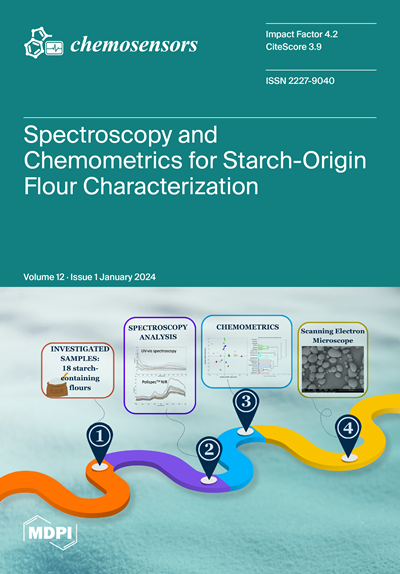Label-Free Electrochemical Sensing Using Glassy Carbon Electrodes Modified with Multiwalled-Carbon Nanotubes Non-Covalently Functionalized with Human Immunoglobulin G
IF 3.7
3区 工程技术
Q2 CHEMISTRY, ANALYTICAL
引用次数: 0
Abstract
This work reports new analytical applications of glassy carbon electrodes (GCE) modified with a nanohybrid obtained by non-covalent functionalization of multi-walled carbon nanotubes (MWCNTs) with human immunoglobulin G (IgG) (GCE/MWCNT-IgG). We report the label-free and non-amplified breast cancer 1 gen (BRCA1) biosensing based on the facilitated adsorption of the DNA probe at the nanohybrid modified GCE and the impedimetric detection of the hybridization event in the presence of the redox marker benzoquinone/hydroquinone. The resulting genosensor made the fast, highly selective, and sensitive quantification of BRCA1 gene possible, with a linear range between 1.0 fM and 10.0 nM, a sensitivity of (3.0 ± 0.1) × 102 Ω M−1 (R2 = 0.9990), a detection limit of 0.3 fM, and excellent discrimination of fully non-complementary and mismatch DNA sequences. The detection of BRCA1 in enriched samples of diluted human blood serum showed a recovery percentage of 94.6%. Another interesting analytical application of MWCNT-IgG-modified GCE based on the catalytic activity of the exfoliated MWCNTs is also reported for the simultaneous quantification of dopamine and uric acid in the presence of ascorbic acid, with detection limits at submicromolar levels for both compounds.使用与人免疫球蛋白 G 非共价官能化的多壁碳纳米管修饰的玻璃碳电极进行无标记电化学传感
本研究报告了用多壁碳纳米管(MWCNTs)与人免疫球蛋白 G(IgG)非共价官能化获得的纳米杂化物修饰的玻璃碳电极(GCE)(GCE/MWCNT-IgG)的新分析应用。我们报告了无标记、无扩增的乳腺癌 1 基因(BRCA1)生物传感技术,该技术基于 DNA 探针在纳米杂化修饰的 GCE 上的吸附,以及在氧化还原标记苯醌/对苯二酚存在下对杂交事件的阻抗检测。由此产生的基因传感器实现了对 BRCA1 基因的快速、高选择性和高灵敏度定量,其线性范围为 1.0 fM 至 10.0 nM,灵敏度为 (3.0 ± 0.1) × 102 Ω M-1(R2 = 0.9990),检测限为 0.3 fM,并能很好地区分完全不互补和错配的 DNA 序列。在稀释的人体血清富集样本中检测 BRCA1 的回收率为 94.6%。另一项有趣的分析应用是基于剥离的 MWCNT 催化活性的 MWCNT-IgG 改性 GCE,在抗坏血酸存在下可同时定量检测多巴胺和尿酸,两种化合物的检测限均为亚摩尔级。
本文章由计算机程序翻译,如有差异,请以英文原文为准。
求助全文
约1分钟内获得全文
求助全文
来源期刊

Chemosensors
Chemistry-Analytical Chemistry
CiteScore
5.00
自引率
9.50%
发文量
450
审稿时长
11 weeks
期刊介绍:
Chemosensors (ISSN 2227-9040; CODEN: CHEMO9) is an international, scientific, open access journal on the science and technology of chemical sensors published quarterly online by MDPI.The journal is indexed in Scopus, SCIE (Web of Science), CAPlus / SciFinder, Inspec, Engineering Village and other databases.
 求助内容:
求助内容: 应助结果提醒方式:
应助结果提醒方式:


